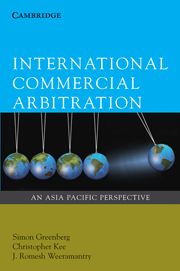Book contents
- Frontmatter
- Contents
- Foreword
- Preface
- Table of Cases
- Table of Statutes
- 1 Introduction to international arbitration and its place in the Asia-Pacific
- 2 Law governing the arbitration and role of the seat
- 3 Applicable substantive law
- 4 Arbitration agreement
- 5 Arbitral jurisdiction
- 6 The arbitral tribunal
- 7 Procedure and evidence
- 8 The award
- 9 The award
- 10 Investment treaty arbitration
- Appendix 1 Asia-Pacific arbitral institutions at a glance
- Appendix 2 Selected arbitral institutions
- Appendix 3 List of UNCITRAL Model Law countries
- Appendix 4 List of parties to the New York Convention 1958
- Appendix 5 Selected list of Asia-Pacific arbitration legislation and instruments
- Glossary
- Index
8 - The award
Content and form
Published online by Cambridge University Press: 05 June 2012
- Frontmatter
- Contents
- Foreword
- Preface
- Table of Cases
- Table of Statutes
- 1 Introduction to international arbitration and its place in the Asia-Pacific
- 2 Law governing the arbitration and role of the seat
- 3 Applicable substantive law
- 4 Arbitration agreement
- 5 Arbitral jurisdiction
- 6 The arbitral tribunal
- 7 Procedure and evidence
- 8 The award
- 9 The award
- 10 Investment treaty arbitration
- Appendix 1 Asia-Pacific arbitral institutions at a glance
- Appendix 2 Selected arbitral institutions
- Appendix 3 List of UNCITRAL Model Law countries
- Appendix 4 List of parties to the New York Convention 1958
- Appendix 5 Selected list of Asia-Pacific arbitration legislation and instruments
- Glossary
- Index
Summary
Introduction
An arbitral tribunal's core function is to make decisions that resolve the dispute submitted to it. These determinations are expressed in written documents called awards.
This chapter concerns aspects of the award that are internal to the arbitration. These aspects are to be contrasted with matters pertaining to the award that are external or outside the control of the arbitral tribunal, such as court litigation relating to setting aside awards or their enforcement. Those external aspects are dealt with in Chapter 9.
A logical starting point for this chapter is the deliberation process arbitrators engage in to make their decisions (Section 2). We then proceed to discuss the content, form and effect of an award (Section 3), the definition of an award (Section 4), the various categories of awards (Section 5), costs awards (Section 6), and the correction and interpretation of awards (Section 7).
Deliberations and decision-making
Once the arbitral tribunal considers that the parties have been given a reasonable opportunity to present their cases, e.g. through the presentation of oral and/or written evidence and submissions on the law and facts, the proceedings will be declared closed. From this point on, the arbitral tribunal must complete its determination of the issues of law and fact in respect of which a decision is required. However, partial deliberations should have begun and been held right through the arbitration.
- Type
- Chapter
- Information
- International Commercial ArbitrationAn Asia-Pacific Perspective, pp. 379 - 410Publisher: Cambridge University PressPrint publication year: 2010



